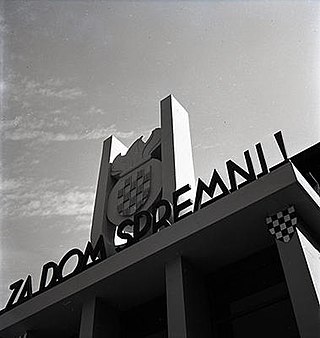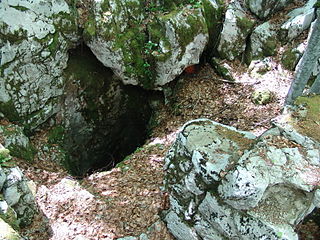Related Research Articles

Jasenovac was a concentration and extermination camp established in the village of the same name by the authorities of the Independent State of Croatia (NDH) in occupied Yugoslavia during World War II. The concentration camp, one of the ten largest in Europe, was established and operated by the governing Ustaše regime, Europe's only Nazi collaborationist regime that operated its own extermination camps, for Serbs, Romani, Jews, and political dissidents. It quickly grew into the third largest concentration camp in Europe.
The Ustaše, also known by anglicised versions Ustasha or Ustashe, was a Croatian fascist and ultranationalist organization active, as one organization, between 1929 and 1945, formally known as the Ustaša – Croatian Revolutionary Movement. Its members assisted in assassinating King Alexander I of Yugoslavia in 1934, and went on to perpetrate The Holocaust in the Independent State of Croatia, killing hundreds of thousands of Serbs, Jews, Roma as well as Bosniak Muslims and Croatian political dissidents during World War II in Yugoslavia.

The Independent State of Croatia was a World War II-era puppet state of Nazi Germany and Fascist Italy. It was established in parts of occupied Yugoslavia on 10 April 1941, after the invasion by the Axis powers. Its territory consisted of most of modern-day Croatia and Bosnia and Herzegovina, as well as some parts of modern-day Serbia and Slovenia, but also excluded many Croat-populated areas in Dalmatia, Istria, and Međimurje regions.

Ljubomir "Ljubo" Miloš was a Croatian public official who was a member of the Ustaše of the Independent State of Croatia (NDH) during World War II. He served as commandant of the Jasenovac concentration camp on several occasions and was responsible for various atrocities committed there during the war. He fled Yugoslavia in May 1945 and sought refuge in Austria. In 1947, he returned to Yugoslavia with the intention of starting an anti-communist uprising. He was soon arrested by Yugoslav authorities and charged with war crimes. Miloš was found guilty on all counts and hanged in August 1948.

Vjekoslav Luburić was a Croatian Ustaše official who headed the system of concentration camps in the Independent State of Croatia (NDH) during much of World War II. Luburić also personally oversaw and spearheaded the contemporaneous genocides of Serbs, Jews and Roma in the NDH.

Stara Gradiška was a concentration and extermination camp in the Independent State of Croatia (NDH) during World War II. The camp was specially constructed for women and children of Serb, Jewish and Romani ethnicity. Victims also included communist and anti-fascist Croats and Bosniaks. It was established by the Ustaše regime in 1941 at the Stara Gradiška prison near the eponymous village as the fifth subcamp of the Jasenovac concentration camp.

The Catholic Church in Croatia is part of the worldwide Catholic Church that is under the spiritual leadership of the Pope. The Latin Church in Croatia is administered by the Croatian Bishops' Conference centered in Zagreb, and it comprises five archdioceses, 13 dioceses and one military ordinariate. Cardinal Josip Bozanić is the Archbishop of Zagreb.
Far-right politics in Croatia refers to any manifestation of far-right politics in the Republic of Croatia. Individuals and groups in Croatia that employ far-right politics are most often associated with the historical Ustaše movement, hence they have connections to Neo-Nazism and neo-fascism. That World War II political movement was an extremist organization at the time supported by the German Nazis and the Italian Fascists. The association with the Ustaše has been called "Neo-Ustashism" by Slavko Goldstein.

Za dom spremni! was a salute used during World War II by the Croatian Ustaše movement. It was the Ustaše equivalent of the fascist or Nazi salute Sieg Heil.

The Genocide of Serbs in the Independent State of Croatia was the systematic persecution of Serbs which was committed during World War II by the fascist Ustaše regime in the Nazi German puppet state known as the Independent State of Croatia between 1941 and 1945. It was carried out through executions in death camps, as well as through mass murder, ethnic cleansing, deportations, forced conversions, and war rape. This genocide was simultaneously carried out with the Holocaust in the NDH as well as the genocide of Roma, by combining Nazi racial policies with the ultimate goal of creating an ethnically pure Greater Croatia.

Full diplomatic relations between Croatia and Israel were established on April 9, 1997 following Croatia's independence from SFR Yugoslavia. Croatia has an embassy in Tel Aviv and honorary consulates in Ashdod, Caesarea, Jerusalem and Kfar Shmaryahu. Israel has an embassy in Zagreb. Relations between the two countries are described as friendly and highly cooperative. In recent years, Croatia and Israel intensified bilateral relations and cooperation in the field of defence and security. Croatia is one of the countries Israel occasionally turns to inside the EU to advocate on its behalf and it generally abstains or votes with Israel on key EU votes at the UN. Israeli president Reuven Rivlin described Croatia in 2019 as "Israel's strong ally in the EU, the UN and other multilateral organizations."

The Jadovno concentration camp was a concentration and extermination camp in the Independent State of Croatia (NDH) during World War II. Commanded by a member of the Ustaše Militia Juraj Rukavina, it was the first of twenty-six concentration camps in the NDH during the war. Established in a secluded area about 20 kilometres (12 mi) from the town of Gospić, it held thousands of Serbs and Jews over a period of 122 days from May to August 1941. Inmates were usually killed by being pushed into deep ravines located near the camp. Estimates of the number of deaths at Jadovno range from 10,000 to 68,000, mostly Serbs. The camp was closed on 21 August 1941, and the area where it was located was later handed over to the Kingdom of Italy and became part of Italian Zones II and III. Jadovno was replaced by the larger Jasenovac concentration camp and its extermination facilities.

The Holocaust in the Independent State of Croatia involved the genocide of Jews, Serbs and Romani within the Independent State of Croatia, a fascist puppet state that existed during World War II, led by the Ustaše regime, which ruled an occupied area of Yugoslavia including most of the territory of modern-day Croatia, the whole of modern-day Bosnia and Herzegovina and the eastern part of Syrmia (Serbia). Of the 39,000 Jews who lived in the NDH in 1941, the United States Holocaust Memorial Museum states that more than 30,000 were murdered. Of these, 6,200 were shipped to Nazi Germany and the rest of them were murdered in the NDH, the vast majority in Ustaše-run concentration camps, such as Jasenovac. The Ustaše were the only quisling forces in Europe who operated their own extermination camps for the purpose of murdering Jews and members of other ethnic groups.

Slavko Goldstein was a Croatian historian, politician, and fiction writer.

Josip Pečarić is a Croatian mathematician. He is a professor of mathematics in the Faculty of Textile Technology at the University of Zagreb, Croatia, and is a full member of the Croatian Academy of Sciences and Arts. He has written and co-authored over 1,200 mathematical publications. He has also published a number of works on history and politics that have been described as comprising historical negationism or Holocaust denial.
Lazar Bačić was a Croatian Serb merchant and philanthropist. Ustashas used his property and industrial facilities to open the Ciglana part of the Jasenovac concentration camp. He was a prominent benefactor of Privrednik.
Igor Vukić is a Croatian journalist and historical negationist. He is an author of books on the Jasenovac concentration camp, including Radni logor Jasenovac, which advances his thesis that Jasenovac was simply a labour camp, rather than an extermination camp as accepted by all serious scholars. He does not have a degree in history.
Denial of the genocide of Serbs in the Independent State of Croatia (NDH), a Nazi German puppet state which existed during World War II, is a historical negationist claim that no systematic mass crimes or genocide against Serbs took place in the NDH, as well as an attempt to minimize the scale and severity of genocide.
The Ustaše Surveillance Service or Ustaška nadzorna služba (UNS) was an intelligence, counter-intelligence and political police service that operated during the existence of the Independent State of Croatia (NDH). The UNS was created by the merger of the Ustaša Intelligence Service and the Service for Concentration Camps through a law that was adopted on 16 August 1941. The UNS was dissolved by a legal provision on 21 January 1943.
References
- ↑ "Uvid u registre - Detalji udruge". registri.uprava.hr. Archived from the original on 2019-01-22. Retrieved 2019-02-06.
- ↑ "DRUŠTVO JASENOVAČKI LOGORI I DJL Zagreb – prihod, dobit, blokada, bonitet i vlasnici te uprava". www.fininfo.hr.
- ↑ Komisija HBK i BK BiH za hrvatski martirologij Archived 2019-02-07 at the Wayback Machine , approached Feb. 6, 2019
- ↑ Branimir Pofuk: Svećenik grmi kako biskupi služe Sotoni. Bozanić to i zaslužuje autograf.hr 06. 05. 2020/
- ↑ Opačić, Tamara (24 November 2017). "Selective Amnesia: Croatia's Holocaust Deniers". BalkanInsight. BIRN.
- ↑ Kosanović, Saša. "Kardinalna ješka". portalnovosti.com (in Serbo-Croatian).
- ↑ Opačić, Tamara. "Besramni revizionizam". portalnovosti.com (in Serbo-Croatian).
- ↑ Luzar, Ivan (29 November 2018). "Manjinci i gospodin Pupovac neuvijeno su napali HRT i Crkvu zbog negiranja ustaštva i zločina u NDH". Telegram.hr (in Serbo-Croatian).
- ↑ Rašeta, Boris. ""Njihov cilj je jasan: Oživljuju NDH!"". www.express.hr (in Serbo-Croatian).
- ↑ Grozdanić, Dragan. "Udri s oltara". portalnovosti.com (in Serbo-Croatian).
- ↑ Duhaček, Gordan. "SVEĆENIK RAZUM Jeste li znali da svi mi plaćamo najvećeg branitelja NDH u Hrvatskoj?". www.index.hr (in Serbo-Croatian).
- ↑ Hrvati sve više osporavaju užase Jasenovca: „Tamo se umiralo od bolesti“, „IN4S“, 15/01/2019